Cricket is often known to be a game of margins. With the advent of the T20 format, this phrase has gained even more significance, more so in the IPL (Indian Premier League).
In the IPL, teams battle against each other in a double round-robin format comprising of 'home' and 'away' games, with the top four teams qualifying for the playoffs.
At the end of the IPL league stage, the margins between teams can be such that the number of points or wins alone may not be enough to separate them. It is when the concept of 'net run rate' kicks in.
A team's net run rate during a competition is the difference of their average runs per over scored by them and the average runs per over scored against them.
In five of the 12 previous editions of the IPL, teams qualified for the playoffs on account of a superior net run rate. Let us have a look at these five instances.
#1: IPL 2009 (Deccan Chargers)
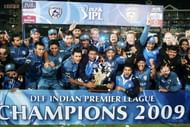
In the second edition of the IPL held in South Africa, Deccan Chargers and Kings XI Punjab ended the league stage of the competition with the same number of points (14). But owing to a far superior net run rate, the Chargers pipped Punjab for the final playoff spot.

Deccan Chargers, under the captaincy of Adam Gilchrist, began IPL 2009 on the perfect note by winning their first four games on the trot. But their form tailed off after the bright start as they won only three of their remaining ten games. However, with 14 points in their kitty, they had done just about enough to claim the last playoff place.
Kings XI Punjab, who were more inconsistent than the Chargers, beat the would-be IPL champions in their penultimate league game to draw level with them on 14 points apiece, albeit with a far inferior net run rate but a game to spare.
With both teams needing a win in their last league game in IPL 2009 to pip the other, Kings XI requiring to do so by a big margin in case the Chargers also won, neither team emerged victorious, though. That meant that, owing to their superior net run rate, the Chargers qualified for the IPL 2009 playoffs at the expense of Kings XI.
During the league stage, the Chargers scored 2111 runs in 272.4 overs and conceded 2097 runs in 278.1 overs they bowled for a net run rate of 0.203. Punjab scored 1787 runs in their 251.2 overs while conceding 1887 runs in 248.3 overs for a negative net run rate of 0.483.
It was just the rub of the green that Gilchrist's team needed. They went on to defeat table toppers Delhi Daredevils in the playoffs. The Chargers then beat Royal Challengers Bangalore in the final to win the IPL title a year after taking the wooden spoon (last position) in the competition's previous edition.
#2: IPL 2010 (Chennai Super Kings and Royal Challengers Bangalore)
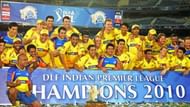
The third edition of the IPL in 2010 saw one of the fiercest battles for playoff places. At the end of the league stage of the competition, as many as four teams were locked with the same number of points (14).
However, only Chennai Super Kings (CSK) and Royal Challengers Bangalore (RCB) went through on account of their superior net rate compared to Delhi Daredevils' (now called Delhi Capitals) and Kolkata Knight Riders' (KKR).

CSK qualified courtesy MS Dhoni's last-over heroics as they won their last league game against Kings XI Punjab to end up with 14 points. RCB also joined the would-be champions in the playoffs despite losing their last match against MI by 57 runs, which dented their net run rate.
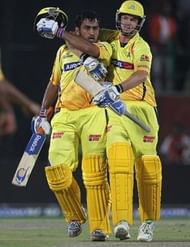
Delhi Daredevils, like Royal Challengers Bangalore, also lost their last league game, doing so against Deccan Chargers. That meant that the Daredevils moved up to 16 points but missed out on the playoffs owing to their inferior net run rate.
Kolkata Knight Riders won their last two games by big margins to move onto 14 points but couldn't improve their net run rate enough to give them one of the two playoff places.
CSK scored 2285 runs in 271.1 overs and conceded 2257 runs in 276.5 overs for a net run rate of 0.274. RCB ended up with a net run rate of 0.219 after they scored 2166 runs in 260.4 overs and conceded 2245 runs in 277.3 overs.
Like Deccan Chargers in 2009, CSK made use of their good fortune by going on to lift their first of three IPL titles.
With six teams in contention till the very end, IPL 2010 remains the most closely contested season in the competition's 12-year history.
#3: IPL 2012 (Chennai Super Kings)
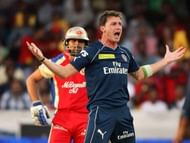
The fifth edition of the IPL held in 2012 saw nine teams compete against each other for the coveted trophy. And once again, like in 2010, CSK and RCB had the same number of points (17) at the end of the league stage, with CSK qualifying for the playoffs because of their superior net run rate.
CSK lost their final league game of the season against Kings XI Punjab to remain on 17 points. RCB won their penultimate match against Delhi Daredevils (now called Delhi Capitals) the same day, in the process moving level with CSK but with an inferior net run rate.
The equation was now pretty straightforward for RCB - beat Deccan Chargers in their last league game and advance to the playoffs at the expense of CSK.

However, what should have been a stroll in the park for the likes of Chris Gayle, Virat Kohli and AB de Villiers turned into an agonising nightmare as RCB went down by nine runs while chasing a modest target of 132. That result meant that CSK advanced to the playoffs instead of RCB.
During the tournament, CSK scored 2232 runs in 293.3 overs while conceding 2144 runs in 285.4 overs for a net run rate of 0.1. RCB, on the other hand, scored 2472 runs in 296.2 overs and conceded 2505 runs in 299.3 overs for a negative net run rate of 0.022.
CSK, however, couldn't repeat their IPL 2010 heroics and lost to Kolkata Knight Riders in the final.
#4: IPL 2014 (Mumbai Indians)
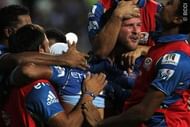
In one of the most dramatic heists in IPL history, Mumbai Indians pulled off a an improbable chase of 190 runs in 14.4 overs in their last league game to pip their opponents Rajasthan Royals on net run rate for a playoff spot. And that was after Mumbai Indians had got off to their worst possible start to an IPL campaign, losing all of their first five matches.
Rajasthan Royals, on the other hand, had seven wins in their first 11 games and required only one win in their last three league games to secure a spot in the playoffs. After losing two of those games, Rajasthan Royals were up against Mumbai Indians in a virtual winner-takes all clash. Owing to their superior net run rate, the Royals could have also gone through if they managed to avoid a heavy defeat.
After scoring 189 runs in their allotted twenty overs, Rajasthan Royals had one foot in the IPL playoffs. That was because any win would not have sufficed for the Mumbai Indians; they needed to chase down those runs in only 14.4 overs at a mind boggling rate of over 13 runs per over.

Mumbai Indians got about their task from the get go, but Lendl Simmons departed in the second over with only 19 runs on the board. In walked Corey Anderson to the crease, a player who hadn't done anything noticeable in the tournament till that point.
After Michael Hussey and big-hitter Kieron Pollard were back in the hut at the end of the fifth over, captain Rohit Sharma joined Anderson at the crease. With Mumbai Indians requiring 81 runs off 33 balls, Sharma also departed. But with Corey Anderson going strong at the other end, Mumbai Indians were still in the chase.
Together in the company of Ambati Rayudu, the equation came down to eight runs off two balls, thanks to a combination of the duo's powerhitting and Rajasthan Royals' lacklustre bowling.
Rayudu struck a juicy full-toss from James Faulkner for a six, leaving Mumbai with two runs to get off the last ball. In a comedy of errors that followed, Rayudu scampered through for a single before finding himself short of his crease while trying to sneak in the winning second run off an overthrow.
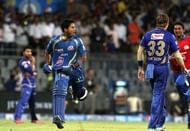
At this stage, the two teams were tied in terms of their net run rates. A huge on-field discussion ensued between the umpires and the players before it was deduced that a boundary off the next ball would be sufficient for Mumbai Indians to go through.
There was one small problem for Mumbai Indians, though. It was Aditya Tare, the new batsman, on strike instead of Corey Anderson who was on 95 off just 44 balls.
However, off another full-toss from Faulkner that followed, Aditya Tare launched the ball over square leg for a six to seal a scarcely believable win for the jubilant Mumbai Indians and a place in the IPL playoffs.

The mood could not have been in starker contrast in the other camp where Rajasthan Royal's ice-cool mentor Rahul Dravid threw off his cap in disgust.
Across their respective league campaigns in IPL 2014, Mumbai Indians scored 2180 runs in 271.3 overs and conceded 2170 runs in 273.3 overs for a net run rate of 0.095, while the Royals scored 2155 runs in 269.5 overs and conceded 2164 runs in 273 overs for a net run rate of 0.06.
Mumbai Indians' luck, however, ran out in the IPL 2014 playoff eliminator where they lost to Chennai Super Kings.
#5: IPL 2019 (Sunrisers Hyderabad)
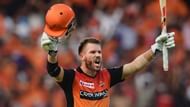
It took another five years after the events of IPL 2014 before net run rate determined a playoff spot in the competition.
After the trio of Sunrisers Hyderabad, Kolkata Knight Riders and Kings XI Punjab ended their respective league campaigns with 12 points apiece, it was SRH who advanced to the playoffs owing to their superior net run rate.

However, all three teams had pretty contrasting league campaigns before they were locked on the same number of points.
SRH won six and lost as many of their first 12 games but still qualified for the playoffs despite losing their last two league fixtures.
KKR, on the other hand, started emphatically, losing only to Delhi Capitals (in a super over) in their first five games, before losing six matches on the trot. However, wins in their next two games saw them level on points with SRH, albeit with a game in hand.
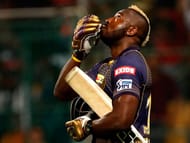
Kings XI Punjab won four of their first six matches and managed only one win in their next seven before ending their league sojourn with a win that put them on 12 points as well. But it was not enough to earn them a playoff place as ended up with a negative net run rate.
In their last league game against Mumbai Indians, KKR needed a victory to pip SRH and reach the playoffs. However, that was not to be as they suffered a heavy defeat against the would-be champions, which only dented their net run rate instead of improving it.
During the league stage, SRH scored 2288 runs in 269.2 overs and conceded 2200 runs in 277.5 overs for a net run rate of 0.577. KKR, on the other hand, scored 2466 runs in 270.4 overs while conceding 2419 runs in 266.2 overs for a net run rate of 0.028.
Incidentally, it marked the first instance in IPL history when a team advanced to the playoffs with only 12 points in their kitty. In the IPL 2019 playoff eliminator, however, Sunrisers Hyderabad lost to Delhi Capitals by two wickets,
Interestingly enough, Mumbai Indians, Chennai Super Kings and Delhi Capitals ended with 18 points apiece at the end of the IPL 2019 league campaign, with net run rate called into play to separate the top three teams.
Brand-new app in a brand-new avatar! Download CricRocket for fast cricket scores, rocket flicks, super notifications and much more! 🚀☄️
